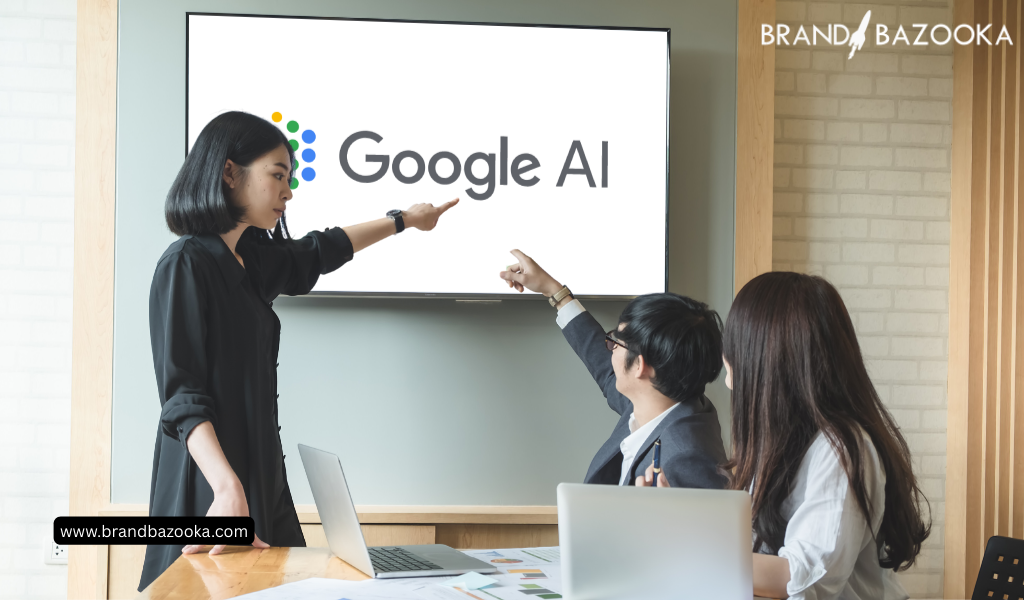Amid the urgency of a digital age, brands are always looking for more intelligent ways to engage their audience. Traditional advertising tools. Many conventional marketing tactics can’t cut it in an environment focused on personalization and big data. This is what AI marketing on platforms like Google AI is revolutionizing. Players are also shifting towards predictive and automated marketing so businesses can reach the right customer at the right time, which is now better than ever.
This article discusses how Google AI is transforming Marketing in today’s age, optimizing customer engagement, and running campaigns more accurately and efficiently for businesses.
What is AI Marketing?
AI in Marketing: AI marketing (artificial intelligence marketing) encompasses leveraging artificial intelligence technologies, like machine learning and predictive analytics, to automate data processing, facilitate customer insights, and provide personalized marketing offers. In contrast to traditional strategies, AI marketing generates campaigns in response to real-time data and adjusts to how users react.
With Google’s ad tools, such as Google Ads and Performance Max, advertisers can now develop finely tuned strategies and even boost ROI considerably.
Why Google AI is a Game Changer?
Google AI assists marketers in many ways. It enables many necessary operations to be carried out automatically (e.g., keyword bid management, audience segmentation, and ad performance analysis). More importantly, it provides advertisers with visibility into the intent and behavior of users across different channels ( search, display, YouTube, and Gmail).
Here’s how Google AI is reinventing digital marketing:
1. Predictive Targeting
Google AI uses machine learning algorithms to predict which users are likely to convert. It does so by analyzing search history, website visits, and engagement. Your ads are displayed to people actively searching for what you have to offer.
2. Automated Bidding Strategies
Google AI also automatically adjusts bids, not you. Tactics like Target CPA and ROAS help ensure you spend where it matters.
3. Smarter Ad Creation
Responsive Search Ads and Dynamic Display Ads use Google AI to create your best-performing headlines and descriptions automatically. The system then tries multiple combinations and presents the most effective versions based on user actions.
4. Cross-Channel Optimization
He said tools like Performance Max use AI to put every bit of Google ad inventory in one campaign. It spreads the budget and placements through channels such as YouTube, Maps, Search, and Display for the best results.
Enhancing Personalization and Customer Experience
Personalization isn’t just a nice-to-have anymore—it’s an expectation. People wish that the brands they follow clearly understood what they wanted, what they liked, and how they behaved. Google AI marketing also supports more in-depth personalization by studying users’ interests, location, demographics, and buying behavior.
Think about sending an email with product recommendations tailored to a user’s recent search history or displaying an ad to a customer who visited your website last week without purchasing.
AI fuels all of these hyper-targeted activities.
Additionally, tools such as Customer Match and Similar Audiences enable you to re-market to previous customers and seek new ones with similar interests, which can increase your conversion rates.
Measuring Success With Data-Driven Insights
The other key benefit of AI in marketing is the value of data insights it brings. Google AI isn’t just executing campaigns; it’s looking deeply at them. With data-driven attribution and conversion tracking tools, marketers can identify the keywords, ads, and devices driving the most conversions.
These learnings strengthen our following strategies and inform other channels about which variations perform better on each platform. This gives campaigns visibility and control without flooding marketers with data.
AI Marketing for Local and Global Reach
Whether aiming for a local or global market, AI marketing can provide scalability. Companies can begin by taking the temperature of their ads locally and then expand based on their success. AI can level the playing field for small and mid-sized businesses, bringing advanced data analytics and personalized insights that don’t necessarily require an enterprise-grade marketing team or budget.
Indeed, many brands are now collaborating with agencies specializing in performance marketing with AI-related tools. For example, if you’re in India, you might consider the benefits of an advertising company in Gurgaon that could help you run an AI-driven Google Ad campaign that’s optimized for the web and caters to both national and local market needs in a more cost-effective and ROI-effective manner.
Future of AI in Digital Advertising
How AI can be applied to marketing will continue to develop along with AI. The future promises more robust features such as voice search optimization, predictive content creation, and real-time automatic ad creatives. Some of these features are already being tested and rolled out by Google AI.
Marketers must keep abreast of AI tools and be willing to dabble in them. No longer is it about manually running ads but rather about using automated systems that get smarter and better with time.
Key Takeaways
Artificial intelligence marketing optimizes reach to the consumer by analyzing real-time data, automating the user’s frequency exposure, better targeting them, and improving ad performance.
Google AI aids advertising by providing capabilities such as automated bidding, dynamic ads, and predictive targeting.
Artificial intelligence-driven personalization enhances customer engagement and loyalty.
Businesses of all shapes and sizes can benefit from AI, particularly when bolstered with specialized support.
The future of AI will also continue to shift how brands deliver to customers online.
Also Read: What’s One Way Google AI Helps Marketers Connect with Potential Customers?
Conclusion
Smarter marketing isn’t a trend; it’s an imperative. With marketing AI, specifically Google-powered tech, companies can design better, more personalized, and more profitable campaigns. Any marketing strategy nowadays will almost certainly include AI—the power to interpret data, automate decisions, and reach the right people is something businesses cannot do without.
Adopting AI marketing is the smarter choice if you prefer to remain competitive and develop better customer relationships.







